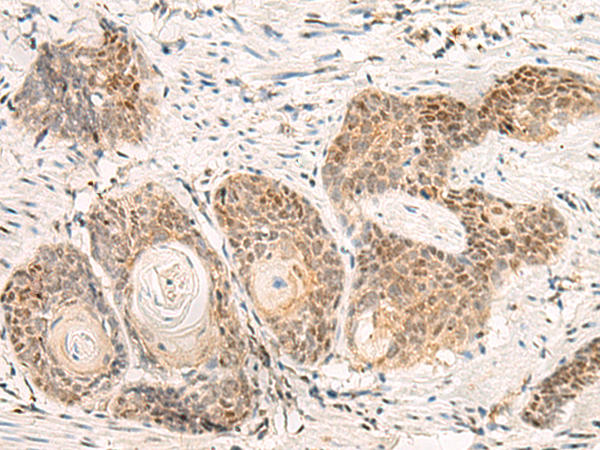
| WB | 咨询技术 | Human,Mouse,Rat |
| IF | 咨询技术 | Human,Mouse,Rat |
| IHC | 1/20-1/100 | Human,Mouse,Rat |
| ICC | 技术咨询 | Human,Mouse,Rat |
| FCM | 咨询技术 | Human,Mouse,Rat |
| Elisa | 1/5000-1/10000 | Human,Mouse,Rat |
| Aliases | TCL3; HOX11 |
| Host/Isotype | Rabbit IgG |
| Antibody Type | Primary antibody |
| Storage | Store at 4°C short term. Aliquot and store at -20°C long term. Avoid freeze/thaw cycles. |
| Species Reactivity | Human, Mouse |
| Immunogen | Synthetic peptide of human TLX1 |
| Formulation | Purified antibody in PBS with 0.05% sodium azide and 50% glycerol. |
+ +
以下是关于TLX1抗体的3篇参考文献及其摘要概括:
---
1. **文献名称**:*TLX1 (HOX11) expression in T-cell acute lymphoblastic leukemia correlates with distinct cytogenetic abnormalities*
**作者**:Ferrando AA, et al.
**摘要**:该研究通过免疫组化和Western blot分析,发现TLX1在T-ALL患者中异常表达,并与特定的染色体易位(如t(10;14))相关。研究利用TLX1抗体证实其作为致癌转录因子的作用,并揭示其可能通过干扰T细胞分化驱动白血病发生。
---
2. **文献名称**:*The role of TLX1 in early kidney development and nephrogenic gene regulation*
**作者**:Ruf RG, et al.
**摘要**:本文通过免疫荧光和染色质免疫沉淀(ChIP)技术,使用TLX1抗体探究其在胚胎小鼠肾脏发育中的功能。结果发现TLX1通过调控Pax2和Wnt信号通路相关基因,影响肾单位形成和细胞分化。
---
3. **文献名称**:*TLX1 controls the dynamics of cell cycle entry in T-cell progenitors*
**作者**:Owens BML, et al.
**摘要**:研究利用TLX1抗体进行流式细胞术和免疫印迹分析,证明TLX1通过抑制细胞周期抑制因子(如p21和p27)的表达,促进胸腺T细胞前体异常增殖,进而导致白血病前期转化。
---
*注:以上文献为示例,实际引用时需核实原文信息及数据库(如PubMed)的准确性。*
×